How Does Marketing Enablement Help Drive Revenue?
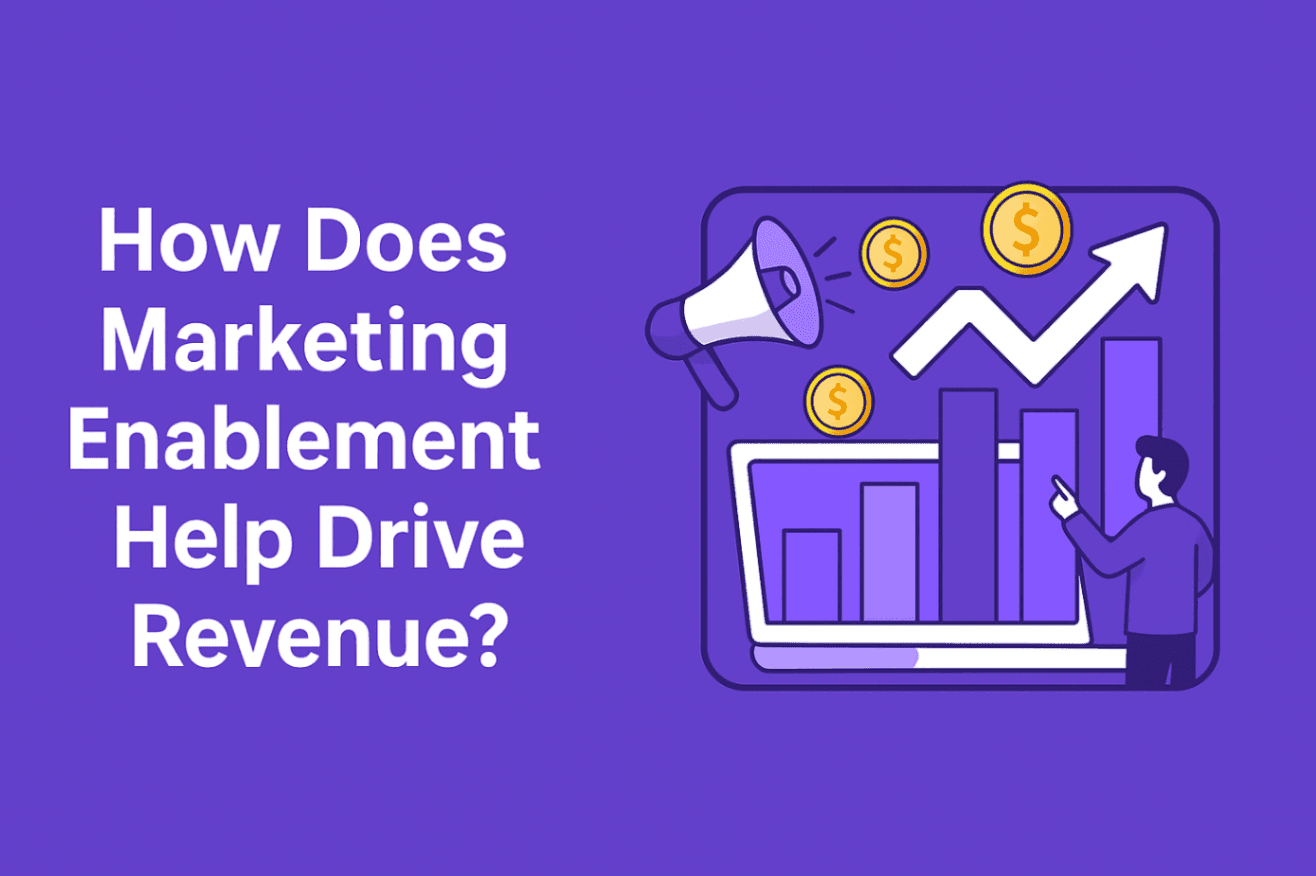
Key Highlights
|
Think your marketing content gets the VIP treatment? Guess again. According to Forrester, up to 70% of marketing content goes unused, which means only 3 out of 10 pieces ever see the light of day.
Welcome to the messy middle of marketing enablement, where the missing ingredient isn't more content, but more usable content.
If your marketing library looks more like a haunted house of unread PDFs and dusty decks, you’ve landed in the right place. Let’s fix that.
What is Marketing Enablement?
Marketing enablement is the strategic process of giving marketing teams the tools, data, content, and frameworks they need to directly support revenue growth.
Marketing enablement software doesn't just “help marketing do marketing.” It’s about making sure marketing efforts are:
Aligned with sales and GTM goals (so content is actually used in the sales cycle).
Data-driven (decisions based on analytics, not guesses).
Scalable and repeatable (processes and assets that can be reused, not reinvented).
Customer-centric (messaging and campaigns built around buyer needs and behaviors).
In practice, Marketing enablement typically includes:
Technology stack: CRM, automation platforms, CMS, analytics, demo tools (like SmartCue).
Content intelligence: Knowing which content gets used, what resonates, and what drives the pipeline.
Processes: Centralized asset libraries, content governance, and playbooks for campaign execution.
Cross-team alignment: Tight coordination with sales, product, and customer success.
Marketing Enablement vs. Sales Enablement: What's the Difference?
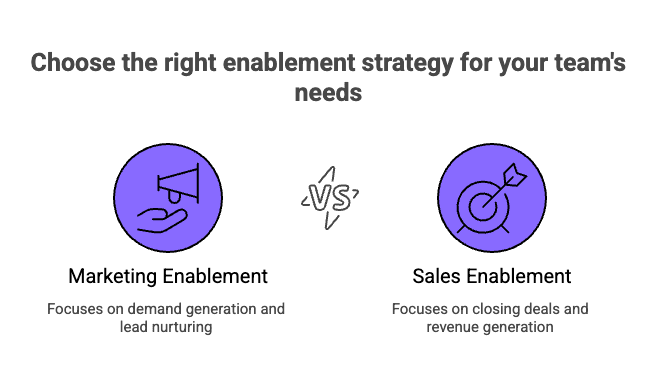
Marketing enablement and sales enablement often get used interchangeably, but while they share the same ultimate goal, driving revenue, they operate at different stages of the customer journey. Both functions rely heavily on content, data, and technology, but who they empower and how they empower them sets them apart.
Here’s a clear side-by-side view:
Aspect | Marketing Enablement | Sales Enablement |
|---|---|---|
Primary Focus | Equip marketing teams to create demand, nurture leads, and generate pipeline | Equip sales teams to engage prospects, handle objections, and close deals |
Stage in Buyer Journey | Early to mid-funnel (awareness, interest, consideration) | Mid to late-funnel (decision, purchase, expansion) |
Core Activities | Content creation, campaign execution, lead nurturing, market insights | Training, pitch decks, demo tools, buyer conversations, playbooks |
Key Tools | CMS, marketing automation, CRM, analytics platforms | CRM, sales enablement platforms, demo software, call intelligence |
Main Output | Educated, engaged prospects | Converted customers and revenue |
Success Metrics | Content ROI, lead quality, pipeline contribution | Win rates, deal velocity, quota attainment |
Analogy | Loads the arrows (creates assets, insights, and demand) | Aims and fires the arrows (uses assets to close business) |
How Does Marketing Enablement Work?
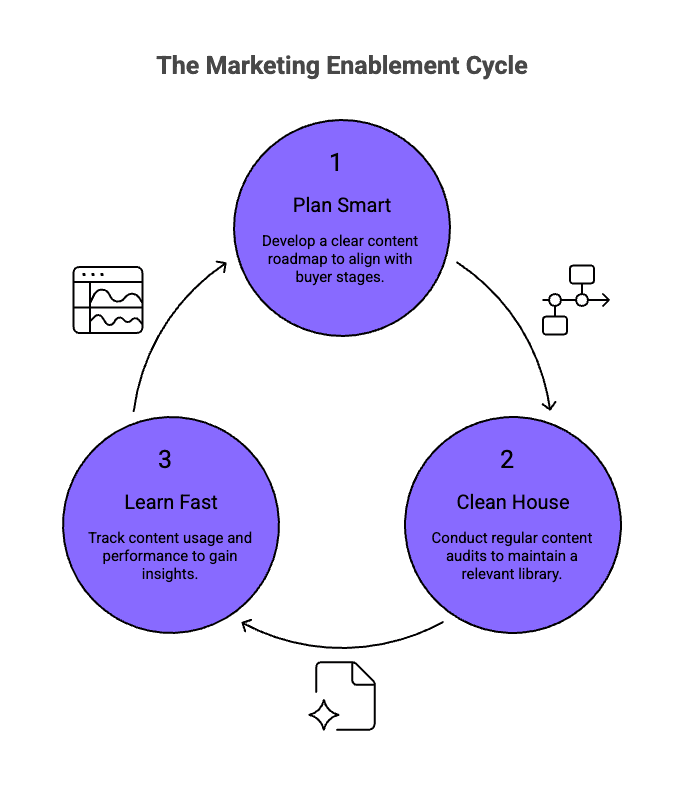
Marketing enablement sounds fancy, but in practice, it comes down to three things: plan smart, clean house, and learn fast.
1. Plan Smart (Project Planning)
Instead of tossing random eBooks or one-pagers into the abyss, marketing enablement starts with a clear content roadmap.
Picture it like meal-prepping for the week: you know exactly what you’ll need, when you’ll need it, and for whom. Campaigns and assets are mapped to buyer stages, so sales isn’t stuck asking, “Do we even have something for this?”
2. Clean House (Content Audits)
Every marketing team has a Dropbox folder that’s basically a content graveyard. Enablement fixes this by running regular content audits, keeping the good stuff, refreshing what’s outdated, and incorporating product marketing strategies while tossing what nobody touches.
The result? A slim, trustworthy library where sellers can grab what they need without wading through junk.
3. Learn Fast (In-Depth Insights)
Here’s the kicker: enablement tracks what actually gets used, who engages with it, and whether it helps close deals. It’s like getting a highlight reel of your content’s performance instead of guessing in the dark. If a demo, case study, or playbook isn’t pulling its weight, you’ll know, and you can double down on the assets that do.
When you put these three pillars together, marketing enablement becomes less about “making content” and more about running a system that feeds the pipeline and makes both marketing and sales look good.
What are The Benefits of Marketing Enablement?
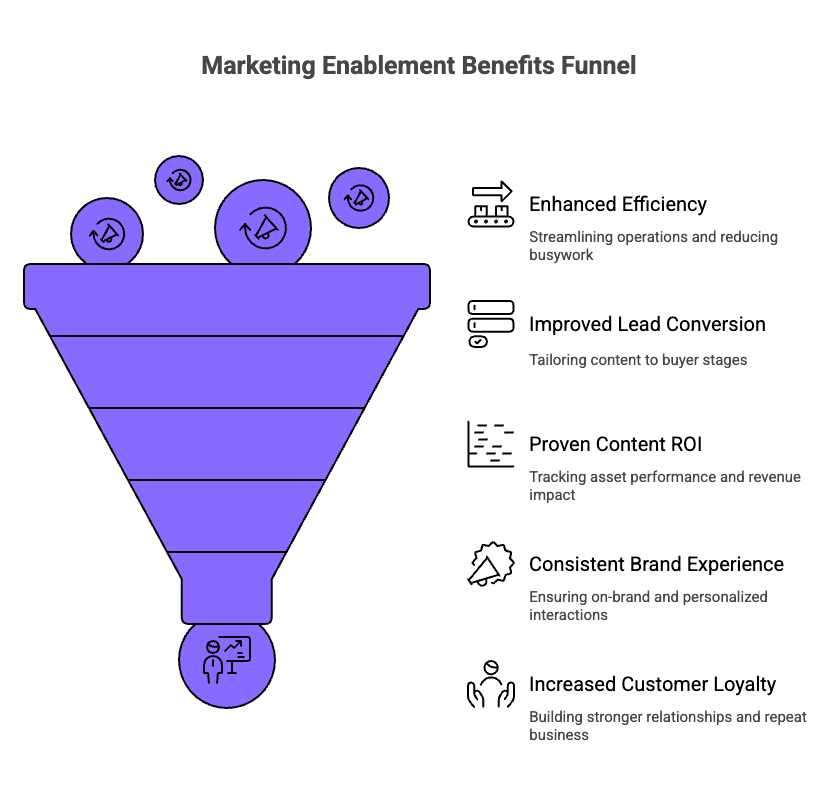
Done right, marketing enablement isn’t just a process tweak; it’s a revenue multiplier. Here’s what it unlocks:
1. Efficiency That Actually Shows
No more duplicate decks or endless “can you resend that PDF?” requests. With a system in place, teams save time, cut busywork, and focus on high-impact campaigns. Companies with aligned sales and marketing teams are 19% more likely to grow faster and 15% more profitable.
2. Better Leads, Higher Conversions
When marketing content is tailored to buyer stages and actually used by sales, prospects move through the funnel faster. Instead of generic eBooks gathering dust, reps share assets that answer real questions, leading to higher win rates.
3. Content ROI You Can Prove
Enablement tools track which assets are opened, shared, and tied to revenue. That means no more arguing over whether a case study “worked”; you’ll have data to show which content pulls its weight and which needs a refresh.
4. Stronger Brand Experience
Consistency matters. Enablement ensures every touchpoint, from a first ad click to a final demo, feels on-brand, relevant, and personalized. That’s what keeps prospects engaged and turns customers into advocates.
5. Happier Customers, Longer Loyalty
With content mapped to real buyer needs, prospects feel understood, not spammed. That translates to better customer experiences, stronger relationships, and repeat business.
What to Look for in a Marketing Enablement Solution?
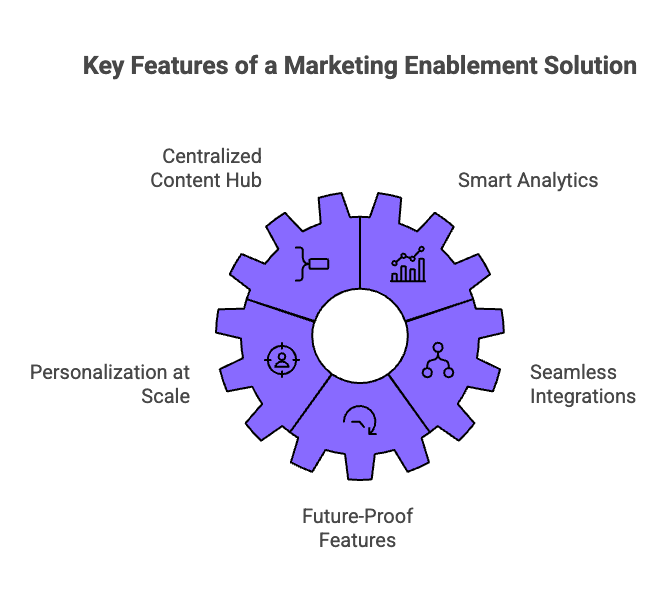
Not every tool that calls itself “enablement” actually solves the problem. The right solution should do more than just store content; it should make content findable, usable, and measurable. Here’s what to look for:
1. Centralized Content Hub
A single source of truth where marketing and sales teams can easily access the latest decks, case studies, demos, and playbooks, without digging through endless folders.
2. Smart Analytics
Tracking goes beyond vanity metrics. You need insights into who used what, how prospects engaged, and whether it influenced deals. That way, you can refine your strategy with evidence, not guesswork.
3. Personalization at Scale
US customer marketing enablement isn’t just about “sharing content.” The right solution should allow teams to tailor assets, think personalized demos, branded collateral, or industry-specific case studies, so every buyer feels like you built it just for them.
4. Seamless Integrations
Your solution should play nicely with CRM, marketing automation, and collaboration tools. No extra logins, no wasted time.
5. Future-Proof Features
AI-driven recommendations, automated audits, and scalable workflows ensure you’re not just keeping up with today’s buyer expectations, but staying ahead of tomorrow’s.
SmartCue’s interactive demo platform checks many of these boxes: a central hub for product showcases, detailed engagement analytics, personalization options, and CRM integrations. It’s a practical example of how modern enablement tools can bridge the gap between marketing and sales, and turn content into a measurable growth driver.
Try SmartCue: Marketing Enablement Made Simple
Not sure how SmartCue fits into your workflow? The best way to find out is to try it yourself, risk-free. Here's how you can create interactive demos that engage leads, shorten your sales cycle, and drive conversions in just a few minutes.
Step 1: Sign Up & Install the Chrome Extension
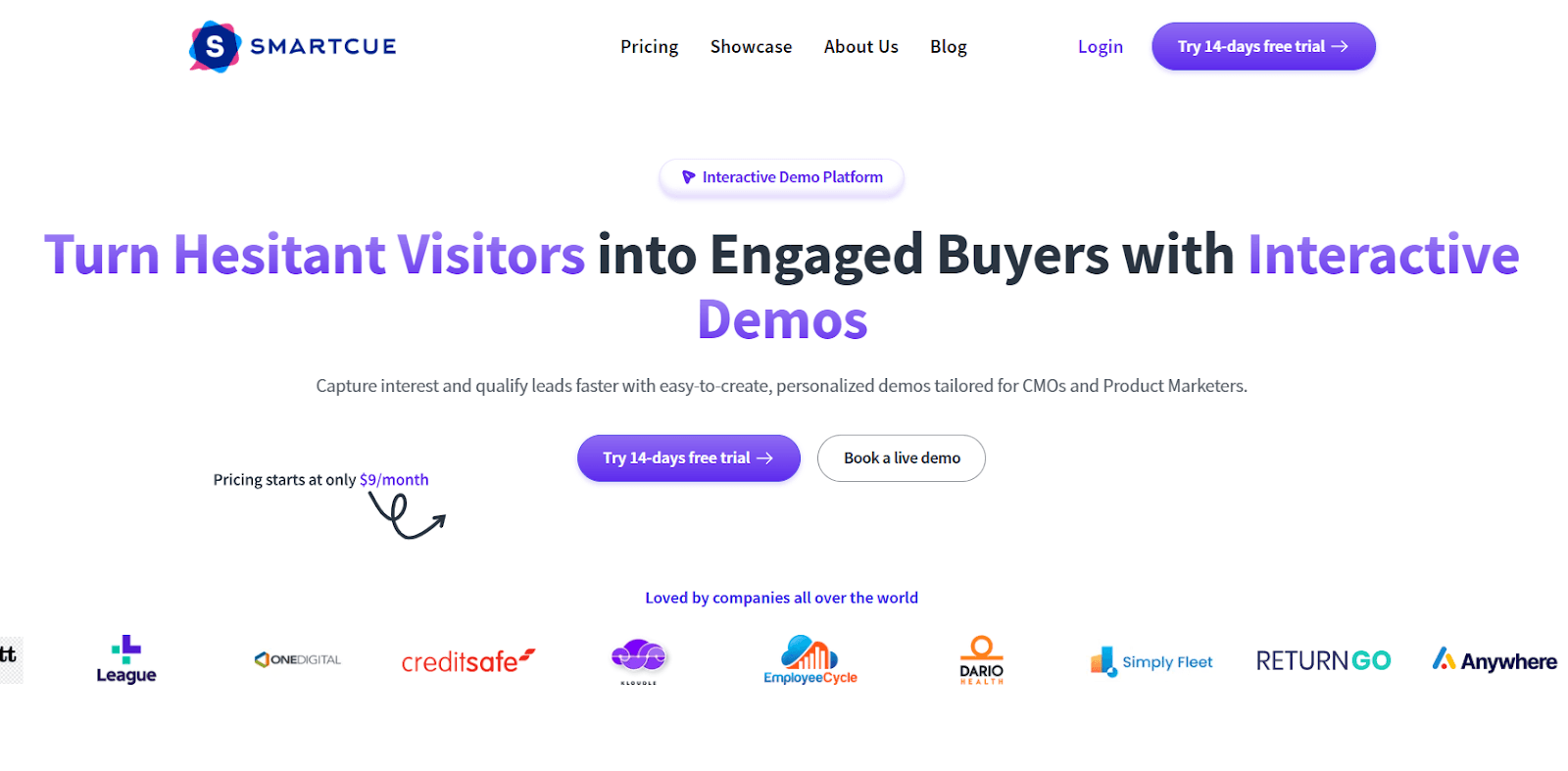
Get started with SmartCue’s free trial and set up your workspace in minutes.
Step 2: Capture & Build Your Demo
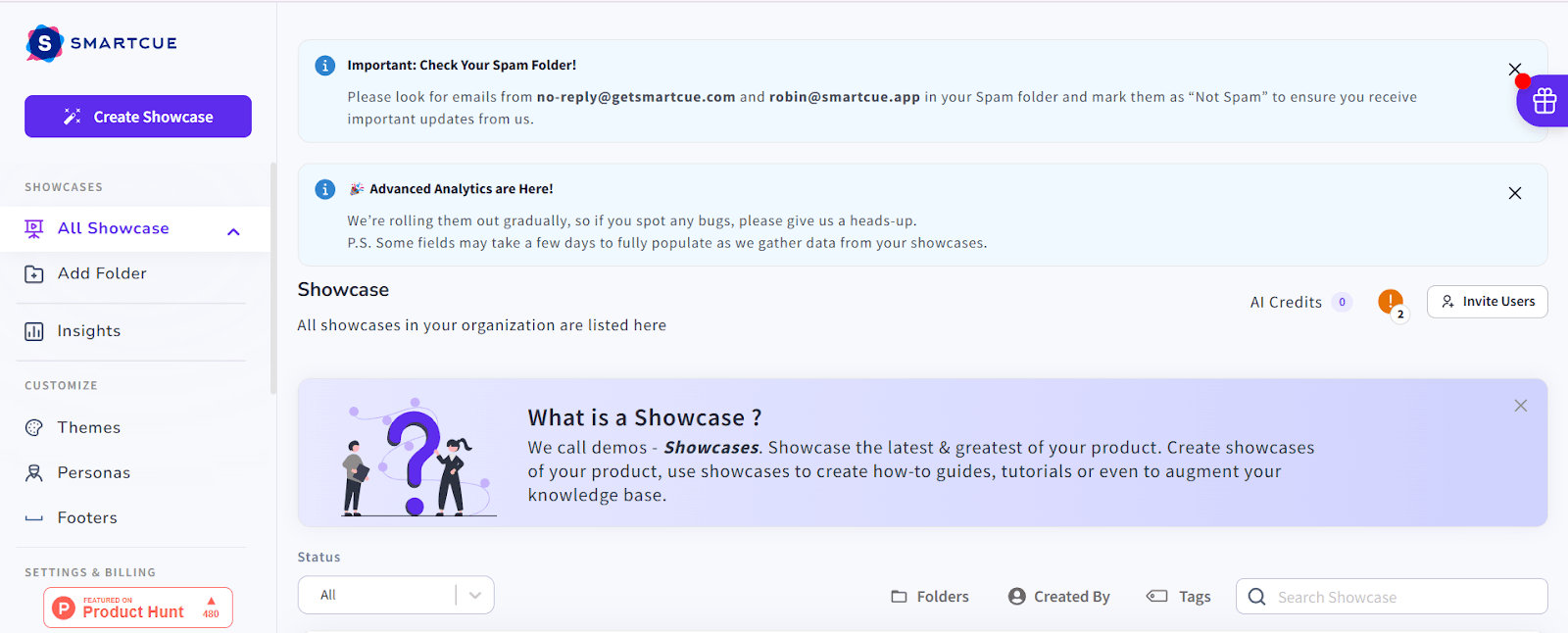
Use SmartCue to record your product walkthrough or start from a ready-made template.
Step 3: Customize for Clarity & Engagement

Add tooltips, text overlays, and interactive elements to guide prospects through your product’s value, without overwhelming them.
Step 4: Share & Track Engagement
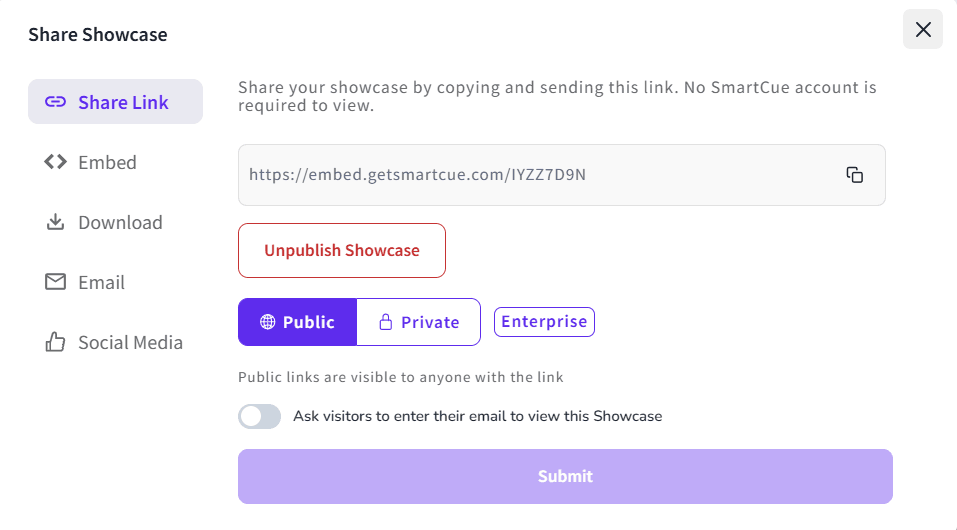
Send your demo link, then track which features prospects engage with the most, so you know exactly what resonates.
Conclusion
Marketing enablement is not about producing more assets; it’s about creating the right ones, making them accessible, and proving their impact on revenue.
When marketing and sales are aligned, content is mapped to buyer stages, and performance is tracked with data, companies can move leads through the funnel faster, shorten sales cycles, and deliver consistent experiences that build trust.
The real value lies in turning marketing from a cost center into a measurable growth engine, one that drives pipeline, strengthens customer loyalty, and scales with the business.
Frequently Asked Questions
How can a business start implementing marketing enablement in their organization?
The first step is to assess current marketing activities and align them with business goals and objectives. Build a simple marketing enablement plan that includes buyer personas, CRM systems, and content management systems.
Why do companies need a marketing enablement framework?
A clear enablement strategy ensures marketing resources are used effectively. With a framework, businesses can align campaigns with target audiences, track marketing performance, and manage content efficiently. This structure leads to better results, stronger customer engagement, and a higher conversion rate.
What challenges do companies face when adopting marketing enablement?
The biggest pain points in the sales enablement market include a lack of clarity on business objectives, poor content management, and scattered marketing initiatives. Without the right tools, enablement efforts can stall, making it difficult to deliver effective content and drive revenue.
Who should be responsible for driving marketing enablement in a company?
An enablement team, usually led by marketing leadership and sales leaders, should own the process. They coordinate with sales reps, manage CRM systems, track market trends, and ensure marketing campaigns align with enablement efforts.
What is the relationship between marketing enablement and B2B sales?
In B2B, marketing enablement efforts support sales reps by equipping them with effective content, buyer personas, and customer relationship management insights that align with the sales process.
What is sales enablement vs marketing?
Sales enablement of sales is about giving reps the right tools, playbooks, and insights to close deals, while marketing enablement definition focuses on building campaigns, managing content marketing, and ensuring effective customer engagement. to support overall revenue enablement.
How does content marketing fit into sales enablement?
Content marketing fuels enablement efforts by providing blog posts, case studies, and landing pages that sales reps can use to address buyer pain points. When tied into CRM systems and social media marketing, content marketing helps nurture leads, improve conversion rates.
What are your favourite sales enablement tools?
Some of the best marketing enablement tools and sales enablement platforms include CRM systems like Salesforce, marketing automation software like HubSpot, and content management systems for blog posts and marketing resources. These tools simplify content management, support content production, and optimize marketing initiatives.
What is the role of marketing enablement of sales?
Marketing enablement of sales means equipping sales teams with the right content, insights, and tools from marketing, ensuring smoother buyer conversations and stronger alignment across the funnel.
How does B2B marketing sales enablement impact the sales enablement market size?
B2B marketing sales enablement drives demand for integrated platforms, directly influencing the sales enablement market size by increasing adoption of tools that align content, data, and buyer engagement strategies.
Comments
Your comment has been submitted